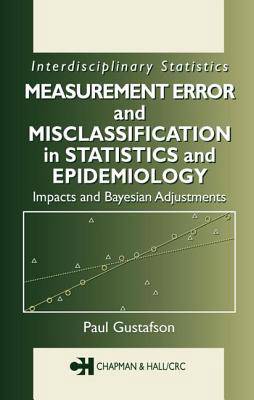
Bedankt voor het vertrouwen het afgelopen jaar! Om jou te bedanken bieden we GRATIS verzending (in België) aan op alles gedurende de hele maand januari.
- Afhalen na 1 uur in een winkel met voorraad
- Gratis thuislevering in België vanaf € 30
- Ruim aanbod met 7 miljoen producten
Bedankt voor het vertrouwen het afgelopen jaar! Om jou te bedanken bieden we GRATIS verzending (in België) aan op alles gedurende de hele maand januari.
- Afhalen na 1 uur in een winkel met voorraad
- Gratis thuislevering in België vanaf € 30
- Ruim aanbod met 7 miljoen producten
Zoeken
Measurement Error and Misclassification in Statistics and Epidemiology
Impacts and Bayesian Adjustments
Paul Gustafson
€ 320,95
+ 641 punten
Omschrijving
Mismeasurement of explanatory variables is a common hazard when using statistical modeling techniques, and particularly so in fields such as biostatistics and epidemiology where perceived risk factors cannot always be measured accurately. With this perspective and a focus on both continuous and categorical variables, Measurement Error and Misclassification in Statistics and Epidemiology: Impacts and Bayesian Adjustments examines the consequences and Bayesian remedies in those cases where the explanatory variable cannot be measured with precision. The author explores both measurement error in continuous variables and misclassification in discrete variables, and shows how Bayesian methods might be used to allow for mismeasurement. A broad range of topics, from basic research to more complex concepts such as "wrong-model" fitting, make this a useful research work for practitioners, students and researchers in biostatistics and epidemiology."
Specificaties
Betrokkenen
- Auteur(s):
- Uitgeverij:
Inhoud
- Aantal bladzijden:
- 200
- Taal:
- Engels
- Reeks:
- Reeksnummer:
- nr. 13
Eigenschappen
- Productcode (EAN):
- 9781584883357
- Verschijningsdatum:
- 25/09/2003
- Uitvoering:
- Hardcover
- Formaat:
- Genaaid
- Afmetingen:
- 162 mm x 241 mm
- Gewicht:
- 421 g

Alleen bij Standaard Boekhandel
+ 641 punten op je klantenkaart van Standaard Boekhandel
Beoordelingen
We publiceren alleen reviews die voldoen aan de voorwaarden voor reviews. Bekijk onze voorwaarden voor reviews.









